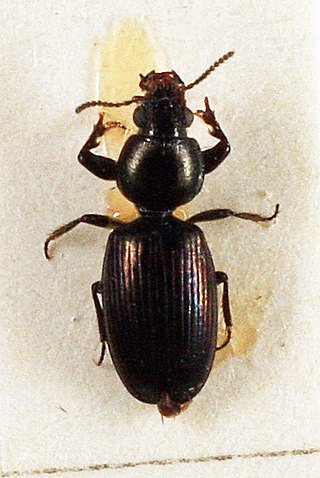
Sten Hjalmar Lindroth was a Swedish historian of learning and science.

Helen Lindroth was a Swedish-born American screen and stage actress.

Bembidion is the largest genus of beetles in the family Carabidae by number of species. All species are small and move very fast. Most of them live close to water. The genus has a biantitropical distribution, meaning they are found in both the Northern and Southern Hemispheres, but not in the tropics. In warmer regions it is substituted by closely related Tachys and other genera.

Dromius quadrimaculatus is a species of ground beetle native to the Palearctic and the Near East. In Europe, it is found in Austria, Belarus, Belgium, Bosnia and Herzegovina, Bulgaria, Corsica, the Czech Republic, mainland Denmark, Estonia, Finland, mainland France, Germany, Great Britain including the Isle of Man, mainland Greece, Hungary, the Republic of Ireland, mainland Italy, Kaliningrad, Latvia, Liechtenstein, Lithuania, Luxembourg, Malta, Moldova, Northern Ireland, North Macedonia, mainland Norway, Poland, Russia, Sardinia (doubtful), Slovakia, Slovenia, mainland Spain, Sweden, Switzerland, the Netherlands, Ukraine, and Yugoslavia.

Synuchus is a genus of ground beetle native to the Palearctic and the Near East. It contains the following species:

Broscinae is a subfamily of ground beetles in the family Carabidae. There are more than 30 genera and at least 340 described species in Broscinae.
Broscodera is a genus of beetles in the family Carabidae, first described by Carl Hildebrand Lindroth in 1961.

Dyschirius is a genus of beetles in the family Carabidae:

Lady Peggy's Escape is a 1913 American silent film produced by Kalem Company and distributed by General Films Company. It was directed by Sidney Olcott with himself, Gene Gauntier, Helen Lindroth and Jack J. Clark in the leading roles.
Dyschirius alticola is a species of ground beetle in the subfamily Scaritinae. It was described by Lindroth in 1961.
Dyschirius campicola is a species of ground beetle in the subfamily Scaritinae. It was described by Lindroth in 1961.
Dyschirius compactus is a species of ground beetle in the subfamily Scaritinae. It was described by Lindroth in 1961.
Dyschirius pacificus is a species of ground beetle in the subfamily Scaritinae. It was described by Lindroth in 1961.
Dyschirius planatus is a species of ground beetle in the subfamily Scaritinae. It was described by Lindroth in 1961.
Dyschirius subarcticus is a species of ground beetle in the subfamily Scaritinae. It was described by Lindroth in 1961.
Dyschirius tenuispinus is a species of ground beetle in the subfamily Scaritinae. It was described by Lindroth in 1961.
Dyschirius timidus is a species of ground beetle in the subfamily Scaritinae. It was described by Lindroth in 1961.
Carl Hildebrand Lindroth was a Swedish entomologist and a professor at Lund University. He was a specialist in carabidology, with a special interest in biogeography. He was a strong proponent of the glacial refugium hypothesis and made use of the framework to explain the distribution patterns of Scandinavian beetles.
Epaphius is a genus of beetles belonging to the family Carabidae.







